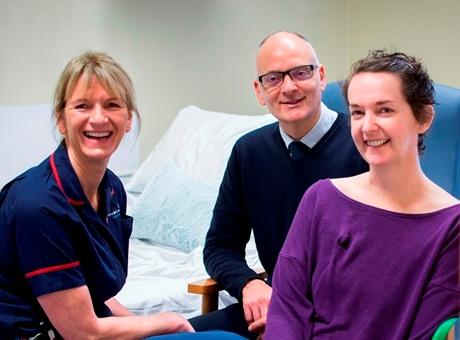A Scottish nurse who survived Ebola and whose recent meningitis illness highlighted lingering and serious long-term effects from the disease has been discharged from an isolation unit in London and will continue her recovery at a hospital in Glasgow.
Royal Free Hospital, where she was initially treated in January and readmitted in mid October, announced today that Pauline Cafferkey was discharged yesterday and admitted to Glasgow's St. Elizabeth's Hospital.
In other Ebola developments, researchers noted storage limitations of the leading vaccine candidate, and Australia eased screening restrictions.
Case raised clinical, scientific questions
The 39-year-old woman was sickened with Ebola in December while serving in Sierra Leone, and her symptoms began when she flew home to Scotland. She was discharged from the hospital for her initial illness on Jan 24, but was readmitted to Royal Free Hospital on Oct 9 with what health officials said was an unusual late complication from the disease.
Over the following week her condition deteriorated from serious to critical, but on Oct 19 the hospital announced that her condition had stabilized. Medical officials said she had meningitis related to her original Ebola infection and that her cerebrospinal fluid tested positive for traces of the virus. Health officials, however, stopped short of saying she had a full-blown Ebola relapse.
Cafferkey's illness raised awareness about the emerging spectrum of serious complications in Ebola survivors, the risks posed by the virus' ability to hide out in immune-protected areas such as the brain, eyes, and the testes, and whether experimental treatments may have any unintended impacts on the disease course.
The woman's illness had prompted tracing of her close contacts, and the experimental VSV-EBOV vaccine was offered to about 40 people who may have had contact with her body fluids.
In its statement today, the hospital said it was delighted that Cafferkey has made a full recovery from Ebola and that she was now well enough to return to Scotland.
Cafferkey in the statement praised the hospital for the care she received. "For a second time staff across many departments of the hospital have worked incredibly hard to help me recover, and I will always be grateful to them and the [National Health Service]," she said. "I am looking forward to returning to Scotland and to seeing my family and friends again."
Vaccine stability
Potency tests on vials of the VSV-EBOV vaccine, intended to be stored at –70°C or less, show that the vaccine is stable for 1 week at refrigerator temperature upon thawing, opening, and storage, researchers from the University of Oslo said today in the Journal of Infectious Diseases.
The investigators conducted the tests to guide researchers in advance of launching phase 2 and 3 trials. In ring-vaccination trials in Guinea, the Canadian-developed vaccine showed high effectiveness, which led to expansion of its use in neighboring Sierra Leone. Since the dosage for the studies had not yet been determined, researchers did stability testing at several dilution levels.
Maintaining proper cold-chain conditions is an important issue for many vaccines and is especially an issue in developing countries, where warmer temperatures and infrastructure gaps may make it more difficult to maintain proper transportation and storage conditions.
Australia eases screening
Australia's government has dialed back some of its screening protocols for people traveling from Ebola-affected countries, Xinhua, China's state news agency, reported today.
Those arriving at international airports will still be screened based on standard policies, but they will no longer need to fill out an Ebola travel history card or have their temperature checked.
Liberia and Sierra Leone have both reached Ebola-free status, and Guinea's cases have been in the single digits for the last several months, with transmission down to its last known chain.
See also:
Nov 12 Royal Free Hospital statement
Nov 12 J Infect Dis abstract
Nov 12 Xinhua story

















